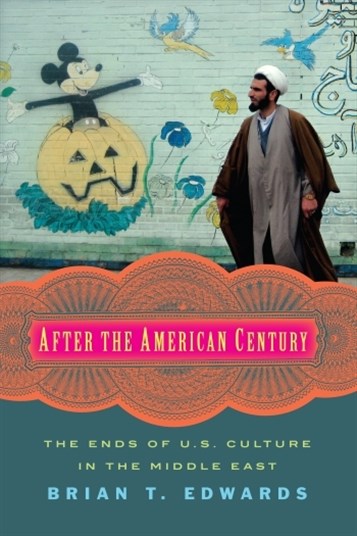When Henry Luce announced in 1941 that we were living in the “American century,” he believed that the international popularity of American culture made the world favorable to U.S. interests. Now, in the digital twenty-first century, the American century has been superseded, as American movies, music, and video games are received, understood, and transformed.
How do we make sense of this shift? Building on a decade of fieldwork in Cairo, Casablanca, and Tehran, Brian T. Edwards maps new routes of cultural exchange that are innovative, accelerated, and full of diversions. Shaped by the digital revolution, these paths are entwined with the growing fragility of American “soft” power. They indicate an era after the American century, in which popular American products and phenomena–such as comic books, teen romances, social-networking sites, and ways of expressing sexuality–are stripped of their associations with the United States and recast in very different forms.
Arguing against those who talk about a world in which American culture is merely replicated or appropriated, Edwards focuses on creative moments of uptake, in which Arabs and Iranians make something unexpected. He argues that these products do more than extend the reach of the original. They reflect a world in which culture endlessly circulates and gathers new meanings
عندما أعلن هنري لوس في عام 1941 أننا نعيش في “القرن الأمريكي” ، كان يعتقد أن الشعبية الدولية للثقافة الأمريكية جعلت العالم مواتًا لمصالح الولايات المتحدة. الآن ، في القرن الحادي والعشرين الرقمي ، تم استبدال القرن الأمريكي ، حيث يتم استقبال الأفلام والموسيقى وألعاب الفيديو الأمريكية وفهمها وتحويلها.
كيف نفهم هذا التحول؟ بناءً على عقد من العمل الميداني في القاهرة والدار البيضاء وطهران ، يرسم Brian T. Edwards طرقًا جديدة للتبادل الثقافي مبتكرة ومتسارعة ومليئة بالتحولات. هذه المسارات ، التي شكلتها الثورة الرقمية ، تتشابك مع الهشاشة المتزايدة للقوة “الناعمة” الأمريكية. إنها تشير إلى حقبة ما بعد القرن الأمريكي ، حيث تم تجريد المنتجات والظواهر الأمريكية الشهيرة – مثل الكتب المصورة والروايات الرومانسية للمراهقين ومواقع التواصل الاجتماعي وطرق التعبير عن الجنس – من ارتباطها بالولايات المتحدة وإعادة صياغتها في أشكال مختلفة جدا.
مجادلة ضد أولئك الذين يتحدثون عن عالم يتم فيه مجرد تكرار الثقافة الأمريكية أو الاستيلاء عليها ، يركز إدواردز على لحظات إبداعية من الاستيعاب ، حيث يصنع العرب والإيرانيون شيئًا غير متوقع. يجادل بأن هذه المنتجات تفعل أكثر من توسيع مدى وصول المنتج الأصلي. إنها تعكس عالما تنتشر فيه الثقافة إلى ما لا نهاية وتجمع معاني جديدة.




